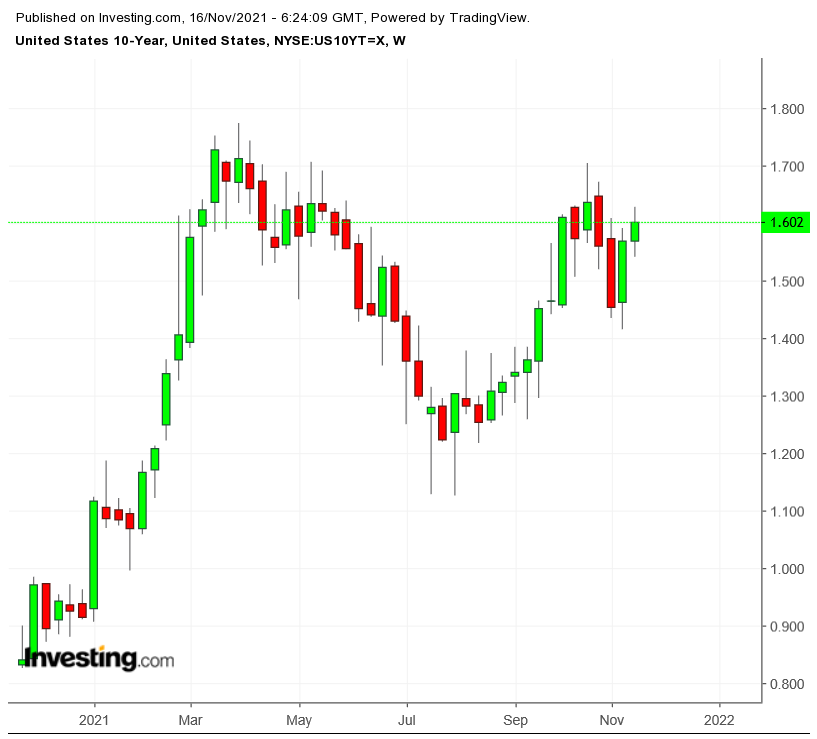The bigger-than-expected jump in inflation last week led to a quick selloff of US Treasuries on Wednesday after data showed a 6.2% year-on-year increase in the consumer price index for October. Yield on the 10-year note spiked more than 11 basis points to top 1.56% after going as low as 1.41% on Tuesday.

After the Thursday holiday, the 10-year yield added 2 bps more on Friday, nearing 1.58%. Yesterday, the yield crossed the threshold of 1.6%.
This volatility is sure to continue as investors remain unsettled about the uncertain direction of policy. Will central banks finally react to steadily increasing inflation that is proving not to be as transitory as they have said?
Traders are cautious, torn between two contrary scenarios—inflation prompts monetary tightening and/or a slowdown in the economy vindicates the current patience.
There is a hoary old word to describe that kind of situation, and “stagflation” is cropping up in commentaries and conversations a lot more often. Its unexpected return is even being described as a black swan event, a reference to surprising developments that often lead to disproportionate reactions.
Nassim Nicholas Taleb, who coined the term and developed the theory, doesn’t expect investors to predict what is by definition unpredictable, but to make financial markets robust enough to sustain the losses. Easier said than done.
Not 70s Era "Chronic" Inflation?
Despite reassurances from the likes of European Central Bank chief economist Philip Lane that the situation today is nothing like the “chronic” inflation that accompanied stagflation in the 1970s, some analysts see events unfolding similarly now—a Federal Reserve that is willing to accept inflation in order to support jobs, massive government spending (the Vietnam war in the earlier period and COVID-19 today), and shortage-induced inflation (the oil shock in the 1970s).
The Fed and the European Central Bank both have adopted a more flexible view of inflation. The US central bank indulged its fondness for acronyms and named the new policy flexible average inflation targeting, or FAIT. The ECB shifted its inflation target from below but close to 2% to a vague medium-term target of 2%.
The current situation is testing both of those new policies and their success depends on policymakers being right that inflation is transitory. The wish may be father to the thought, but investors wonder if the policy is just mistaken.
The roller coaster ride of the 10-year Treasury yield reflects that investor uncertainty. Yield on the benchmark note reached near 1.7% in October before plunging near 1.4% last week and now soaring back above 1.6% and moving upwards.
Eurozone government bond yields followed Treasuries higher on Monday even though low issuance tempered the rise. The ECB bond purchases are further reducing supply. Germany, according to a Danske Bank analyst, is on tap to issue just €16 billion in bonds, barely covering €15.5 billion from maturing debt, while ECB bond purchases of more than €25 billion are starving a market seeking safe havens.
ECB officials are sticking to their line that it is pandemic-related bottlenecks that are slowing growth and spurring inflation. Investors aren’t buying it, and money markets are pricing in two ECB rate hikes before the end of 2022.
